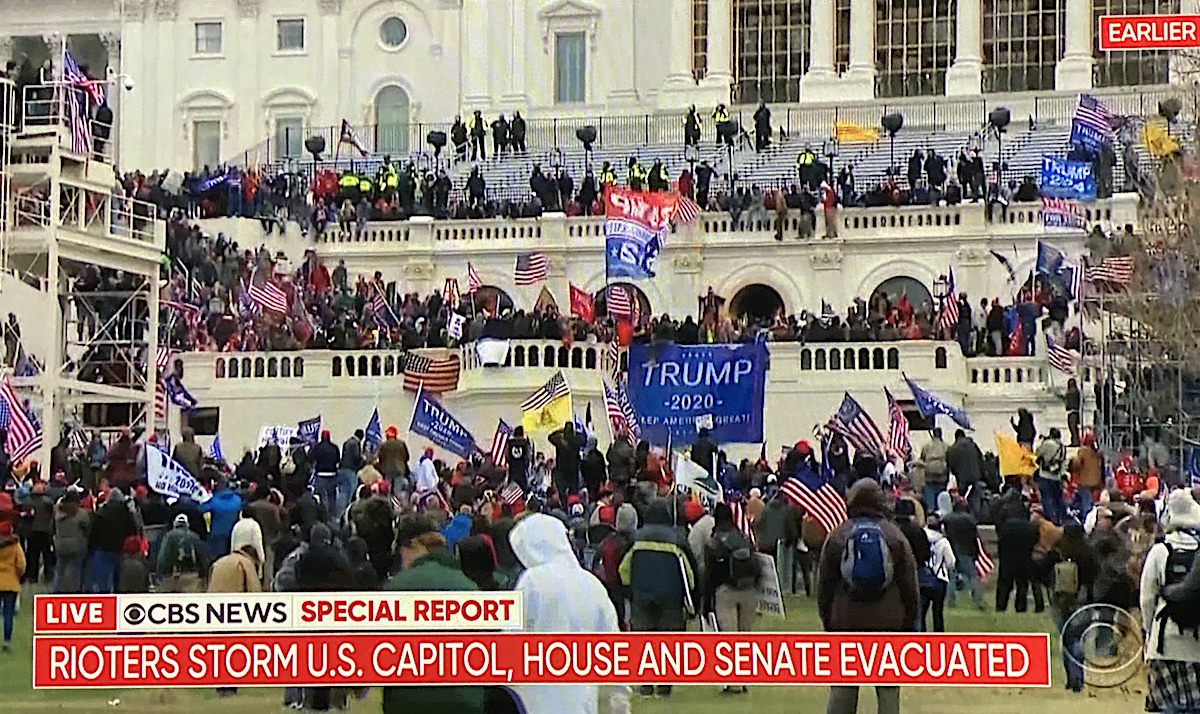
(GA Recorder) | WASHINGTON — Senate Republicans on Friday blocked consideration of a bill creating a bipartisan, independent commission to investigate what happened leading up to and during the Jan. 6 attack at the U.S. Capitol.
Legislation to form an investigatory panel into that attack passed the House of Representatives earlier this month, with 35 House Republicans joining Democrats in backing the measure.
Friday’s procedural vote in the Senate required support from at least 10 GOP lawmakers to advance to debate on the proposal and end a GOP filibuster.
Only six Republicans — including Sens. Susan Collins of Maine; Bill Cassidy of Louisiana; and Rob Portman of Ohio — joined with Democrats in the 54-35 vote, which needed 60 senators in agreement to move ahead. Eleven senators did not cast a vote.
Sen. Pat Toomey (R-Pa.) was absent due to a family commitment, according to his spokesman, who said Toomey would have voted in favor of debating the legislation. He also was supportive of an amendment from Collins to address concerns about the commission’s staffing and duration.
Even with Toomey’s support, three additional GOP yes votes would have been needed to advance the bill.
In a statement after the vote, Cassidy — who also voted to convict former President Donald Trump on impeachment charges of inciting the Jan. 6 riot — said the legislation would ensure GOP lawmakers had equal involvement in an investigation that will occur even if they object.
“The investigations will happen with or without Republicans,” Cassidy said. “To ensure the investigations are fair, impartial, and focused on the facts, Republicans need to be involved.”
Other senators not voting on Friday included Marsha Blackburn of Tennessee, Roy Blunt of Missouri, Richard Burr of North Carolina, Jim Risch of Idaho, and Kyrsten Sinema of Arizona.
The Senate vote was expected to occur on Thursday, but it was delayed when Sen. Ron Johnson (R-Wis.) and other conservatives raised objections to a separate bipartisan bill seeking to boost U.S. competitiveness against China. Final votes on that bill ultimately were postponed to next week so the Senate could vote on the Jan. 6 commission legislation.
Republicans opposed setting up a 10-member commission — which would be appointed by lawmakers from both parties and styled on the panel that investigated the Sept. 11 terrorist attacks — criticized the commission’s makeup and said it was unnecessary given the other investigations underway.
“There’s no new fact about that day we need the Democrats’ extraneous commission to uncover,” Senate Minority Leader Mitch McConnell (R-Ky.) said during a floor speech Thursday.
Democrats have argued that the panel is critical to establishing a comprehensive, independent analysis that pulls together all the events leading up to the crowd of rioters storming the Capitol hallways, destroying property, and assaulting law enforcement officers who were protecting lawmakers and staffers.
“I can’t imagine anyone voting against the establishment of the commission on the greatest assault since the Civil War on the Capitol,” President Joe Biden said ahead of the Senate vote.
Seeking to sway opponents, the mother and the longtime partner of fallen Capitol Police Officer Brian Sicknick spent Thursday meeting with GOP senators, urging them to back the commission. Sicknick was one of five people who died in the Jan. 6 assault and its aftermath.
“Usually, I stay in the background, and I just couldn’t stay quiet anymore,” Sicknick’s mother, Gladys, told reporters after the two women and two officers who responded to the insurrection met with Sen. Mitt Romney, a Utah Republican. Romney ultimately voted in favor of advancing to debate on the commission.
Other GOP senators who met with the group lobbying for the commission’s creation included Toomey, Johnson, Collins, and Roger Marshall of Kansas.
Johnson has falsely described the Jan. 6 attack as largely a “peaceful protest.” After meeting with Sicknick and the officers, he said in a statement that “although we disagreed on the added value of the proposed commission, I did commit to doing everything I could to ensure all their questions will be answered.”
Marshall’s position also was unchanged by his meeting with Sicknick’s family. He said in a statement that he believes the ongoing investigations “will bring to light the needed answers and detail how security at the Capitol can be enhanced moving forward.”
Investigations are already underway by the Justice Department and multiple committees in the House and Senate. The Justice investigation, which is ongoing, has led to charges against more than 440 individuals so far, with those prosecutions likely to last for years.
Sen. Amy Klobuchar (D-Minn.), who leads one of the committees involved in the Senate inquiry, said the congressional investigations are focused on immediate responses needed to remedy mistakes that occurred on Jan. 6.
“But it is no substitute for a 9/11-style commission,” Klobuchar added.
Collins, who supports an independent commission, had drafted an amendment to the commission legislation, seeking to ensure that staffers for the panel are jointly appointed by both Democrats and Republicans, and not just by the Democratic-appointed chairman.
She told reporters that there was “widespread support” among Republicans for her proposed changes but also acknowledged that some GOP senators are “simply opposed to having a commission in any form.”
Majority Leader Chuck Schumer (D-N.Y.) dismissed the reasons cited by Republicans against the commission as “silly” and not reflective of their true motivation: that such a panel would upset former President Donald Trump, who was impeached but not convicted of inciting the rioters who stormed the Capitol that day.
“If our Republican friends vote against this, what are you afraid of? The truth?” Schumer asked in his floor speech ahead of Friday’s vote. “Are you afraid Donald Trump’s big lie will be dispelled? Are you afraid that all of the misinformation that has poured out will be rebutted by a bipartisan, down-the-middle commission?”
The failed vote is likely to further intensify the toxic atmosphere on Capitol Hill, which has worsened in the wake of the Jan. 6 attack.
Some Democrats have refused to work with Republicans who voted against certifying the 2020 presidential election on Jan. 6, a point of particular tension with some Republicans who are downplaying the violence that day.






